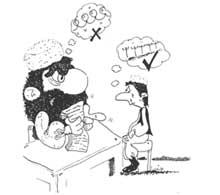Laughing is healthy
1986/06/01 Agirre, Jabier - Medikua eta OEEko kidea Iturria: Elhuyar aldizkaria
Laughter is the exclusive way of human communication, one of our most peculiar forms of behavior. As we laugh with our friends and friends, we laugh at our enemies. In addition, we turn our desires and fears into jokes and laughter. And even if it is so everyday, laughter is one of the most intimate and endearing things of the human being, the mark or sign that most differentiates us from animals.
Each person has his own way of laughing. The enigmatic irritation of Leonardo da Vinci's Gioconda is not the same as the carob that produces clowns. In some cases laughter can also cry. Today you can also artificially laugh using nitrogen suboxide (or laughter gas).

Nobody knows why we don't all laugh at the same thing, and why something that we find funny at a certain time doesn't influence us in another type of bakery. Laughter grabs us more than any other mood; laughter is contagious. And it acts as a proper and proper massage of the internal organs.
When we throw a laugh, the pupils expand with bright eyes and blood pressure and heart beat frequency are below their usual levels. On the other hand, laughing is a release to the body. Anger and laughter protect us from discomfort, chasing fear and bad conscience. Jokes are like a dream, in both our symbolic desires and aspirations are fulfilled. When the person is awake, his path of liberation is laugh and laugh, but while he sleeps the aggression is released with his dreams.
At the base of laughter we perceive a certain distance from what happened. According to Sigmund Freud, laughter is nothing more than "saving or preserving feelings." When someone slides with a banana crust and falls to the ground, our first reaction will be laughter, but only if we see what happened from a distance. If we put ourselves in that person's place, it would be impossible to keep laughing.
At the same time, laughter indicates that we are calm, normally. This peaceful reflection has been deeply rooted throughout evolution in the human species and today, within us, it is still alive as a rather ambiguous feeling: we laugh for shyness, but also when we find ourselves confused, when we are chained between two feelings that are contradictory.
When laughter sets in, it is above our will. We can't do anything to avoid it, just laugh. Without warning, the succession of normal things is interrupted, breathing is completely confused. We expel the air we breathe harder and the longer we laugh, the less air we have in our lungs. So, after a heavy laugh attack, we need at least a couple of seconds to recover and breathe normally.
The heart also suffers its passage. When we laugh, heart beats can reach 120 per minute (usually around 70). It also increases blood pressure. After laughter, these two figures descend slightly from the normal level. Doctors believe it is a good exercise to laugh at people with high stress. However, for a sick heart excessively hard laughter can be harmful.
When a person laughs, his hypothalamus secretes a substance called beta-endorphin. This LAUGHING ENZYME calms and enjoys tensions, efforts, burukominas and depressions. On the other hand, laughter stimulates the glands that act on digestion: when we are in a good mood the stomach works better, uses better food and this makes us fat. See how we have been dressed scientifically that saying that "laughing means getting fat."
There is no doubt that laughing helps the body a lot. Let us forget our grief and our misfortunes and open the way to laughter, joyful and joyful moments that our body will thank. So be it!

Gai honi buruzko eduki gehiago
Elhuyarrek garatutako teknologia




